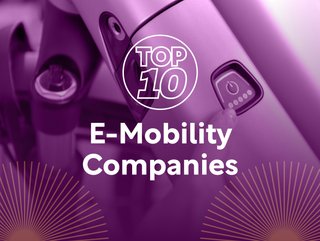
Referring to the use of electric vehicles (EVs) and other electric-powered transportation modes, e-mobility has catapulted into the mainstream in recent years — whether that be through the mass popping up of e-bikes and e-scooters on street corners or plug-in hybrid electric vehicles (PHEVs). Notably, the significant attention amassed from e-mobility’s standing as a sustainable alternative to traditional fossil fuel-based transport.
E-mobility is now highly regarded as a global concern, with smart cities — areas made more efficient with the use of digital solutions — helping propel the advancement of technology and growing environmental awareness which is seeing interest in electric transportation soar.
Here, we run through 10 of the leading e-mobility providers and share how they promote sustainability through clean energy sources.
10. Ola Electric
Indian electric two-wheeler manufacturer Ola Electric is the country’s largest electric two-wheeler manufacturer, valued around US$5.4 billion as of September 2023. The company’s initiatives and EV efforts are in tandem with wider goals to reduce carbon emissions and to promote different methods of cleaner, greener transportation.
One of the key markets Ola makes waves in is mopeds — battling against widespread city congestion across India with electrification at its core. It makes a key impact here, as its cost-competitive, well-performing mobility solutions are available to the masses, allowing mobility to work in the pursuit of sustainable growth.
9. Citymapper
Providing services to more than 50 million users across 100 cities, Citymapper is a public transit app and mapping application that uses transit tech to promote a slicker and more sustainable future. The app works in promoting active travel — walking, cycling, scootering — making it a bigger part in how populations move, highlighting how a journey itself is equally as important as the destination. Applauded over more mainstream mapping services for its public transport insights, providing the best routes and precise timetables, encouraging more energy-efficient modes of transport.
8. Spin
Proving that micro mobility is a powerful, transparent and accountable ally in the fight against climate change, Spin solves urban transport challenges by making electric scooters a true transport solution. With e-scooters much less emissions-intensive than single-occupancy vehicles, MIT data shows that Spin’s emissions per passenger kilometre is 38g CO2e, considerably less than other forms of public transit. It also advocates for the 15-minute city, stating the landscape of city transportation needs rebalancing with shared micro-mobility a puzzle piece of the ecosystem. By subscribing to Spin, customers can gain an unlimited number of rides each month, which provides significant ease of sustainability.
7. Zipcar
Zipcar is clued up when it comes to the impact of cars when it comes to climate change, carbon emissions and environmental footprint. While driving isn’t exactly good for the planet — passenger cars are the highest source of transportation-related greenhouse gas emissions — it encourages biking, walking, or commuting via public transportation over getting behind the wheel, but also appreciates that’s not always possible. The car-sharing initiative allows commuters to save money while also selecting a transport solution that equates to less overall emissions, making travel more affordable for its users.
Zipcar also encourages energy-efficient driving techniques to ensure its users, whether in one of their vehicles or otherwise, are making the smallest negative environmental impact possible.
6. ChargePoint
ChargePoint is the world's largest network of EV charging stations in North America and Europe, having installed more than 18,000 chargers across the US and other countries, leading to more than 100,000 charging ports. Its networked charging offering allows customers to gather and analyse data such as who is using which stations and when, the cars they drive and how much energy is being used for charging, and from where. ChargePoint says that this data allows for transparency in line with their sustainability targets, all while empowering customers to understand the return on their investment and assess the need for more chargers.
5. Lyft
In a bid to lead the transition to zero emissions across the areas it operates in, Lyft has committed to its fleet of vehicles being 100% electric by 2030. It offers mobility as a service, from bikes to cars, and allows its customers to decide whether they want to take transportation into their own hands or share it with others. In 2018, Lyft was also the first and only company of its kind to become carbon neutral. Lyft says that, once adopted widely, EVs hold the promise of making cities more livable by dramatically reducing air pollution.
4. DiDi Global
Chinese vehicle-for-hire company DiDi Global offers a wide range of app-based services, whether that be ride hailing and other forms of shared mobility or energy and vehicle services, food delivery, among others. As a leading mobility technology platform provider, it supports electrification and, thanks to its operations across APAC, Latin America, Europe, and Africa is valued at more than US$20bn, and is committed to solving the world's transportation, environmental and employment challenges through the use of AI technology and localised smart transportation innovations.
3. Bird
With the slogan “Cleaner air. Less Traffic. More joy.” Bird offers eco-friendly rides in hundreds of cities worldwide. The company is passionate about vibrant communities that have less traffic, cleaner air and safer streets, ensuring this through new transportation options complementing public transit systems and by investing in safety infrastructure that benefits everyone. The company provides e-bikes and e-scooters in a multitude of services to cities and university campuses where transport is easier and cheaper via personal, micro-mobility methods. The team is also committed to growth through supporting cities to adopt electrified solutions, enhancing mobility in a sustainable way.
2. Lime
Lime is supporting sustainable, smart mobility by using technology to evolve and inform. An e-scooter operator at its core, the company’s assets were used for 120 million trips in 2022 across 150 cities in more than 30 countries, equating to around four rides every second. Lime has proven successful in areas where there is limited demand from consumers to own e-scooters of their own.
Powered by 100% clean, green energy from Octopus Energy, Lime was the first shared electric vehicle company to power all of its e-bikes, e-scooters, warehouses and offices on renewable energy. It has met its 100% renewable energy commitment thanks to this, as well as measuring all e-scooter and e-bike battery consumption and ensuring all charging is matched with renewables, regardless of charging location. According to Lime, “decarbonising transportation isn’t just the future, it’s happening today”.
1. Uber
Leading the way down the road to zero emissions is Uber. It’s safe to say that Uber is changing the way the world moves and how it moves forward. By 2023, Uber is aiming to be a zero-emission mobility platform across the UK by 2030, with other goals set across the various other geographies it operates in. Uber is investing in electrification through its commitment to net-zero emissions and is switching its current London-based fleet of 45,000 cars to all-electric vehicle models. By educating those in the company and its customers on zero-emission vehicles, or ZEVs — vehicles that do not emit exhaust gas or other pollutants from the onboard source of power — and the role they play in the roadmap towards sustainability, Uber hopes to bring all on board with its electrified vehicle strategy.
*******************
Make sure you check out the latest edition of Energy Digital Magazine and also sign up to our global conference series - Sustainability LIVE 2024.
*******************
Energy Digital is a BizClik brand.






